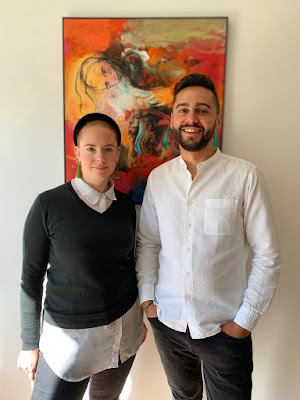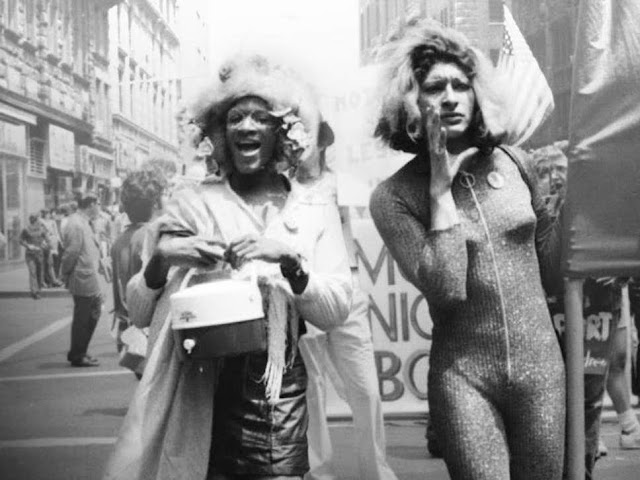 |
| The Stonewall Inn, site of the 1969 Stonewall riots |
Reviewed by Robert Hugill on 5 July 2019 Star rating: (★★★★★)
A brilliant evocation, in words and music, of the Stonewall Riots and gay life in New York in 1969
2019 is the 50th anniversary of the Stonewall riots, which happened in New York in 1969 and are regarded as the most important event leading to the gay liberation movement. To open London Song Festival's 2019 Outsiders season at Hinde Street Methodist Church on 17 October 2019, artistic director Nigel Foster commemorated the anniversary with a programme entitled The Outsiders Fight Back. Foster was joined by Lotte Betts-Dean (mezzo-soprano), Felix Kemp (baritone) [who took part in the festival's 2018 Leonard Bernstein celebration, see my review], Michael Harper (narrator) and Peter Tatchell (speaker), with visuals by video artist James Symonds. There was song by Margaret Bonds (1913-1972), Leslie Adams (born 1932), Christopher Berg (born 1949), Mischa Spoliansky (1891-1985), William Bolcom (born 1938), Chris DeBlasio (1959-1993), Lee Hoiby (1926-2011) and Jerry Herman (born 1931), plus the world premiere of a new song cycle by Ben Moore (born 1960), And Another Song Comes On, with words by Mark Campbell (librettist of Iain Bell's opera Stonewall), commisioned by the London Song Festival, along with a spoken narration from Michael Harper taken from eye witness accounts of the period, plus a short address from Peter Tatchell whose involvement with the gay liberation movement goes back to London Gay Liberation Front in 1971.
 |
| Lotte Betts-Dean and Felix Kemp |
Essential to the evening were Michael Harper's narrations, these were taken from the memoirs and writings of people who had actually been there, from transgender activist Marsha P Johnson and gay liberation and transgender rights activist Sylvia Rivera to Ray Castor, one of the first people arrested during the riots, to an anonymous writer in the East Village Rambler, 12 November 1969.
The first half was an evocation of gay life, such as it was, in New York in the 1960s prior to the riots, with narration and song interleaved into a single striking whole. Michael Harper's delivery was vivid, and some of his material priceless (sometimes shocking, often very funny), but the musical performances from Lotte Betts-Dean and Felix Kemp were equally strong, helping the music to stand out. For much of the evening, the shadow of American musical theatre stood behind the music in a way that it does not do in 20th century English music. Both Kemp and Betts-Dean are clearly comfortable in this style, never losing the vibrancy of voice and keeping a strong sense of line but giving primacy to the words. The two are quite different performers in style, complementary indeed, but both drew strong effects from the music. Betts-Dean seemed to have a real knack with bluesy torch songs, whilst Kemp was superbly moving in lyrical ballads.
Margaret Bonds was one of the first black composers to gain recognition in America, and she often worked with Langston Hughes, one of the leading figures of the Harlem Renaissance. Lotte Betts-Dean gave an expressively intense account of their Minstrel Man from Three Dream Portraits, a song very much about internalising pain, written about the black experience but applicable to many.
Leslie Adams is a choral conductor and composer, his Five Millay Songs were written in 1960, setting texts by the American poet and playwright Edna St Vincent Millay, who was known for her feminist activism. Felix Kemp brought an achingly expressive quality to For you there is no song from the Five Millay Songs.
Christopher Berg is largely a self-taught composer, and we heard two of his Songs on Poems of Frank O'Hara, all settings of the American poet Frank O'Hara (1926-1966), a poet whose poetry describes the artistic and gay life of New york in which he lived. Lotte Betts-Dean gave a vibrant account of Song (1951), a song which had distinct musical theatre hints and whose subject matter was the eternal 'I'm going to New York'. Felix Kemp's relaxed yet intense account of the ballad Song (Is it dirty) enunciated the thoughts about people and places of a young man coming to New York for the first time.
We ended the first half with Moore and Campbell's And Another Song Comes On, a cycle of five songs 'Shirley', 'Elvis', 'Henry', 'Dusty', 'Diana, Marvin, Gladys, Barbra etc', the first four of which take a particular song by a well known singer, and last makes a sort of short story sequence of four songs. Each movement was a personal narration, the free-form thoughts of the person listening to the song, and as such an imaginative re-creation of the young (and not so young) denizens of the Stonewall Inn that evening in 1969. Honours were shared between Betts-Dean and Kemp, and both were vividly communicative, with fine diction (we did not have printed words, and did not need them).
Moore's compositional output ranges from art song and opera, to musical theatre, cabaret and comedy material, his style is lyrical and tonal, with a clear nod to the American musical theatre tradition but with a complexity to the material too, so that it is easy to understand why major figures in the classical music world have taken up his songs. 'Shirley' was a lyrical ballad, a pair of interwining monologues from Kemp and Betts-Dean, whilst in 'Elvis' Betts-Dean gave us a fabulous, low-voiced blues, a real tour de force. 'Henry' (Henry Mancini) was an unashamed hymn to camp, yet the music was not pastiche or camp, but rather striking and Kemp's performance was strong indeed ('fabulous'). 'Dusty' from Betts-Dean was, as might be expected, rather poignant whilst the final number, which both singers performed, moved from the easy lyricism of a ballad to the requisite big finish.
The second half opened with a sequence of songs interleaving a description of the riots themselves, and Kemp had changed into a black t-shirt emblazoned with the words 'The Stonewall Inn'. The musical material was imaginatively varied. Mischa Spoliansky's Das Lila Lied is one of the earliest 'gay right's protest songs written for Berlin in the 1920s and sung here in Jeremy Lawrence's English words. Kemp and Betts-Dean made it nicely pointed, with a good emphasis on the words. William Bolcom's Places to Live comes from his 1979 song cycle Cabaret Songs with words by Arnold Weinstein, written for Bolcom's wife Joan Morris. It is a complex, cabaret art song, and Betts-Dean made it seem easy and relaxed. Chris DeBlasio's Poussin comes from his song cycle All the way through the evening, written in 1990 to chart the experiences of a young gay man dying of Aids. Poussin is an interesting, complex and poetic piece and I would love to hear the whole song cycle. But Perry Brass' words are quite tangential, and it feels a wordy song you felt that its situation in the sequence of music did not do it justice, despite Kemp's powerful advocacy. A repeat of Das Lila Lied, led to an eye-witness description of one of the most memorable events in the riots, the elite police task force being faced with a high-kicking chorus-line of men. And at this point Michael Harper burst into song, 'We are the village girls'.
This sequence finished with Lee Hoiby's Where the music comes from, lyrical and quite old-fashioned for 1973, yet complex and not particularly musical theatre influenced. Kemp and Betts-Dean gave a nicely plangent performance but the last word was left to Michael Harper, 'We weren't going to go away, and we didn't'.
This led to the short talk from Peter Tatchell, not a description of Stonewall but a meditation on its meaning starting with its effect on him, a 17 year old closeted gay man in Melbourne. His key point perhaps was that the importance of Stonewall wasn't the riots themselves, but what they produced, the Gay Liberation Front, the first mass coming out the strong, mobilised, politicised movement of LGBT people (of the UK organisations formed in the wake of Stonewall, including London Gay Liberation Front, one still survives and still provides sterling service, Switchboard, originally London Gay Switchboard, the LGBT+ helpline which was founded in 1974).
The evening ended with the words of Marsha P Johnson, the transgender activist, and Jerry Hermann's song I am what I am from his 1983 musical La Cages au Folles, quiet and touching at first but developing into a real torch song. And of course, a real ear-worm, I still have the song going round in my head as I write this.
 |
| Marsha P Hunt and Sylvia Rivera (from Netflix: 'The Death and Life of Marsha P. Johnson' ) |
Accompanying the programme were superbly evocative visuals from video artist James Symonds. Symonds had used old photos, but created something poetic and thoughtfully imaginative.
The London Song Festival's Outsiders season continues next week (24 October) with The Sexual Outsider, songs setting poems by Walt Whitman whose bicentenary is celebrated in 2019. And also to come in the season are Music from the Pacific, The Exiled Outsiders (music from Jewish exiles in the UK), The Autistic Outsider, The Musical Outsider, The Emotional Outsider, and Outsider Women
Elsewhere on this blog
- Royal Welcome Songs for King Charles II, volume II , the Sixteen on CORO (★★★★) - Cd review
- A Day of the Dead at the Oxford Lieder Festival: Doric String Quartet, Thomas Oliemans, Malcolm Martineau, Prof. Helen Swift - concert review
- Intimations of mortality: A Young Man's Exhortation to Boyhood's End at Oxford Lieder Festival (★★★★) - concert review
- A work of scholarship and a fine performance: Academy of Ancient Music's new recording of Handel's Brockes Passion (★★★★★) - CD review
- A barren emotional landscape barely disguised by the production’s kitsch fairy-tale opulence: Turandot, Met Live in HD (★★½) - opera review
- Bringing a rarity alive: Verdi's Un giorno di regno from Chelsea Opera Group (★★★★) - opera review
- Voices in the Wilderness: cellist Raphael Wallfisch on his series of cello concertos by exiled Jewish composers - interview
- The Song of Love: songs & duets by Vaughan Williams from Kitty Whately, Roderick Williams, William Vann (★★★★) - CD review
- Will put a smile on your face: Vivaldi's L'estro armonico in new versions from Armoniosa (★★★) - CD review
- 17th century Playlist: from toe-tapping to plangently melancholy, Ed Lyon & Theatre of the Ayre (★★★★★) - CD review
- Magic realism, politics and terrific songs: Weill and Kaiser's Winter's Fairy Tale in an imaginative production from English Touring Opera - opera review
- Orpheus goes to Hell: Emma Rice's lively new production somewhat misses the point of Offenbach (★★★) - opera review
- Thought provoking and engaging: Mozart's The Seraglio at English Touring Opera (★★★★) - opera review
- Home




.jpg)






No comments:
Post a Comment